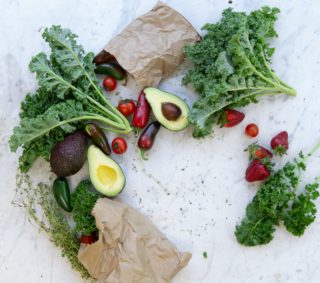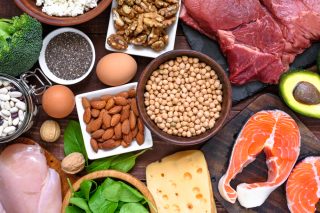It’s no secret that certain types of foods are better for us than others. Since the beginning of the pandemic, we’ve all been looking for ways to make your health a priority. But could eating a plant-based diet really be the answer? Some research suggests that eating a plant-based diet could actually reduce the severity of the symptoms if you do contract Covid-19. But is this true? Is there any scientific evidence to back it up?
About the study
The study, published in BMJ Nutrition, Prevention and Health, set out to determine if any particular diet can offer protection against COVID-19. Based on the findings, health professionals who followed vegetarian, vegan, or pescatarian diets reportedly had a lower risk of developing moderate-to-severe COVID-19. Additionally, researchers also found that those who followed a low-carbohydrate or high-protein diet seemed to have an increased risk of contracting moderate-to-severe COVID-19.
It definitely doesn’t change the risk of being infected
 One major thing to note is that no diet can change the actual risk of contracting Covid-19. Unfortunately, there isn’t a diet in the world that can protect you from getting a specific illness. It also has no effect on the length of the illness. Instead, the study does suggest that there is a link between diet and the potential severity of the illness. Another important thing to note about this particular study is that it was very small with only 3000 health professionals across six western countries taking part. Another thing to note is that only 138 of these people developed a moderate-to-severe disease. Each person in this category had to choose one of 11 categories to put their eating habits into. Essentially, the sample was incredibly small.
One major thing to note is that no diet can change the actual risk of contracting Covid-19. Unfortunately, there isn’t a diet in the world that can protect you from getting a specific illness. It also has no effect on the length of the illness. Instead, the study does suggest that there is a link between diet and the potential severity of the illness. Another important thing to note about this particular study is that it was very small with only 3000 health professionals across six western countries taking part. Another thing to note is that only 138 of these people developed a moderate-to-severe disease. Each person in this category had to choose one of 11 categories to put their eating habits into. Essentially, the sample was incredibly small.
Some problems with this study
Because of how small this study was, people that ate fish had to be grouped with vegetarians and vegans in order to produce any kind of meaningful results. Of the 138 people in the study, only 41 vegetarians and/or vegans and 5 pescatarians even contracted the disease. To further complicate matters, only a few of these people experienced moderate to severe symptoms. One of the major issues with such small numbers is that it can increase the risk of falsely identifying links that aren’t actually present. This is called a type-1 error by statisticians.
Another issue, these types of studies are observational. That means that they can only suggest theories and links. Thus, it doesn’t actually test causality. In order to do so, a plant-based diet would need to be tested as an intervention. So, test subjects would have to change their eating habits to a plant-based diet. This would then have to be compared with those who didn’t change their eating habits and instead, continued eating an omnivorous diet. This particular study also relied on self-reporting. This leaves a lot to chance and means that people may not be following the diet that they claim to be.
Yes, plant-based diets are good for you
So, what are we saying here? There is no doubt that plant-based diets are very healthy for us and the environment. Of course, this is only true if you are  doing it correctly. Eating heavily processed foods is not good for you, even if they are vegetarian or vegan. Plant-based diets do seem to be a healthier option for many of us. However, the focus does have to be on eating whole foods and overall nutritional value. According to the Cleveland Clinic, studies have shown that eating a plant-based diet can definitely reduce your risk of:
doing it correctly. Eating heavily processed foods is not good for you, even if they are vegetarian or vegan. Plant-based diets do seem to be a healthier option for many of us. However, the focus does have to be on eating whole foods and overall nutritional value. According to the Cleveland Clinic, studies have shown that eating a plant-based diet can definitely reduce your risk of:
- Heart disease
- Hypertension
- Diabetes
- Colon and breast cancers
- Obesity
Plant-based diets all seem to be good for weight management and reducing bad cholesterol in the body.
The takeaway: could plant-based foods help?

artem evdokimov/shutterstock
Though a plant-based diet may be healthy, there is really not enough data to link a plant-based diet with less severe Covid-19 symptoms. The data available from this study was really too small to be of any real value. In order to prove any kind of link between eating a plant-based diet and a reduction in the severity of COVID-19 symptoms, a larger, more in-depth study would need to be conducted. This would mean that participants would need to be closely monitored.
There would also need to be differentials allowed for, such as fresh vs processed foods. So, whilst, as of right now, there may be no proven link between less severe COVID-19 and a plant-based diet, there are a few things we do know. Eating a healthy diet and making sure that we are maintaining a healthy weight are vital. Covid-19 has been proven to be more severe in less active and overweight people. So, rather than rushing to switch to a plant-based diet, it’s best to make sure you’re eating healthily. Make sure you get your exercise, eat fresh food rather than processed and maintain a healthy weight.
References
https://health.clevelandclinic.org/is-a-plant-based-diet-right-for-you/
https://theconversation.com/does-a-plant-based-diet-really-help-beat-covid-19-162214



![women [longevity live]](https://longevitylive.com/wp-content/uploads/2020/01/photo-of-women-walking-down-the-street-1116984-100x100.jpg)










